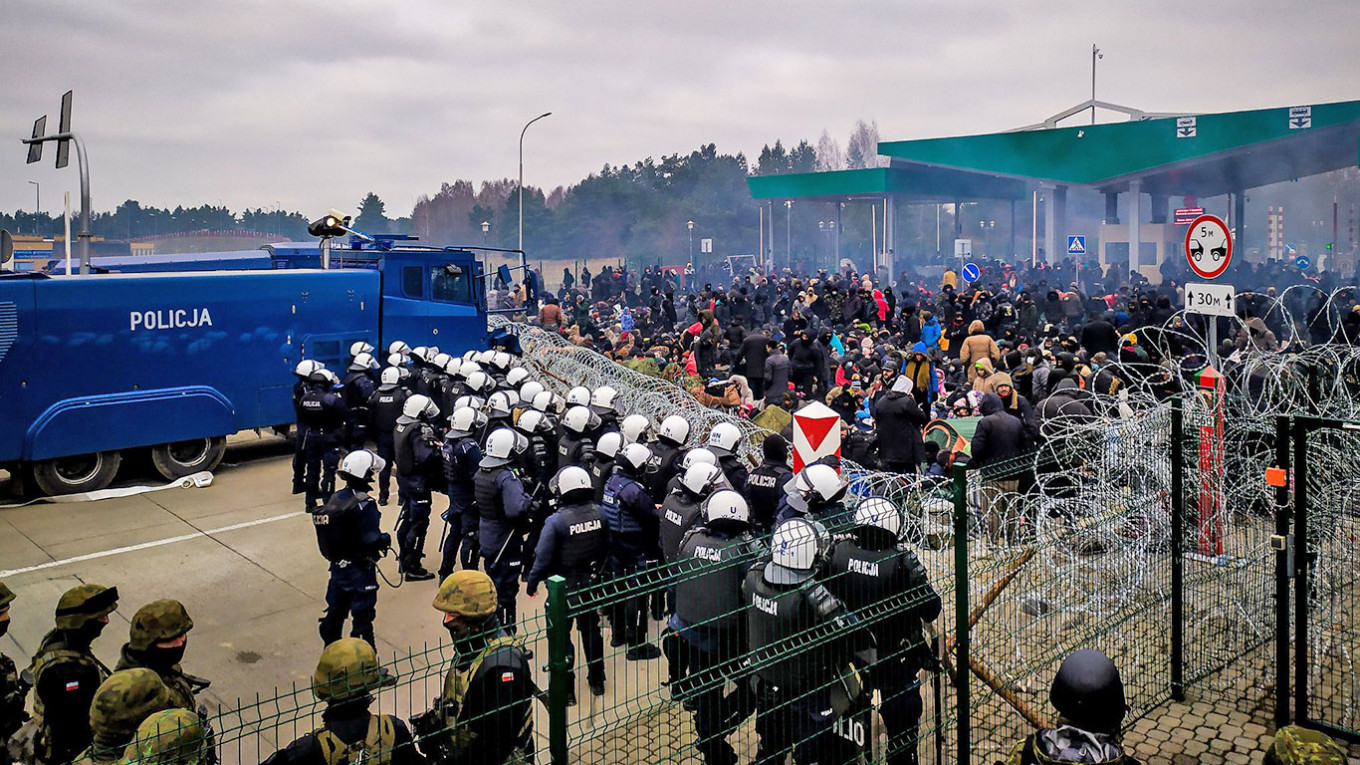Watching with dismay the expert coverage of the Belarus-Polish migrant crisis, it occurred to me that we need to retire the hybrid war concept, at least from news coverage. It’s become unhelpful at best and dangerous at worst, both in terms of understanding what Belarus is doing and the wider issue of Russia’s role in the neighborhood and beyond.
Since the summer, Belarus has been enabling migrants, mostly from the Middle East, to travel through the country, huddling them up against the Polish border, even as President Alexander Lukashenko threatened to bring a migrant crisis to his neighbour’s doorstep. Polish Prime Minister Mateusz Morawiecki called Vladimir Putin the mastermind of the crisis, with officials and commentators widely describing the standoff as part of Putin’s “hybrid warfare” playbook.
But not only does this language hobble our ability to really do anything about this human tragedy, let alone make sense of it. The very rhetoric of war risks bringing war closer.
Ultimately, we cannot know what goes on in the conversations between Putin and his client Lukashenko and our feeble attempts to ascribe intent are based on conjecture. This week, Belarus restricted oil through the Druzhba pipeline to Poland and it emerged that Lukashenko, in his phone call with German Chancellor Angela Merkel, allegedly demanded recognition and an end to sanctions in exchange for ending the crisis.
Are all of these things, the migrants, the threats, the oil restrictions, part of some grand, coordinated onslaught managed from Moscow, or simply a series of retaliations for sanctions by a wavering dictator with no clear plan?
The move to restrict oil really put Russian pipeline monopoly Transneft on the spot. In his statement, the company’s representatives called the Belarus repairs “unscheduled,” in effect distancing itself from this decision. The Kremlin, of course, is silent. Which doesn’t mean it’s pleased.
That means literally: it may not necessarily mean anything at all. To know means to presume that Lukashenko knows exactly what he’s doing, that he approved this decision with Moscow, and that there’s some kind of reasonable plan. I’m not so certain. After all, Putin has warned against Minsk threatening to cut off oil and gas supplies to Europe as a move that will risk the already shaky relations between Russia and Belarus. More to the point, Lukashenko has a history of threatening Moscow as well.
Let’s assume that Lukashenko and Putin are coordinating all these actions and statements, and especially that it’s part of a larger power play against European countries that also, absurdly, includes Russian troop build up on the Ukrainian border — but to achieve what, exactly? End sanctions?
That scenario presumes a Kremlin that is either incredibly stupid or exceedingly smart, and that it’s adopted a strategy of three-dimensional chess that would make anyone’s head spin, and that its relations with Lukashenko are seamless and trustworthy.
But none of these things are true. In my 20 years of writing about Russian foreign policy, I have yet to witness Putin thinking more than two steps ahead. Chess is probably the worst analogy for Putin’s behavior on the world stage, let alone for Lukashenko, who has a history of angering everyone around him, including Putin, without any clear plan.
Perhaps Lukashenko had something of a plan prior to August 2020, when a particularly rigged election sparked mass protests and repressions that ultimately stripped the leader of much of his legitimacy. Until then he had been playing bait and switch with Moscow, oscillating between the Russians and the West in attempts to haggle out some choice energy subsidies from Russia. If it was a strategy, it failed because Moscow itself ultimately got tired of his unreliability and cut back on the subsidies.
Since then, supporting Lukashenko has been a chore for the Kremlin, but a chore it can’t seem to let up precisely because when U.S. and EU officials and commentators make irresponsible comments tying up Lukashenko and Putin in some kind of wholesale “hybrid war” against the west it only vindicates Kremlin paranoias.
Alas, Mark Galeotti has been one of the few voices to make the obvious point that making Putin responsible for Lukashenko has the effect of pushing them together.
But I would also argue that our very fixation on the term “hybrid war” to describe what is happening is making the problem worse, and muddling what is actually going on.
Do Lukashenko’s actions theoretically constitute hybrid warfare? Possibly. Maybe. Likely. But here’s the problem. What is even a hybrid war?
Simply put, it is being nasty to your neighbor or another country by using non-military means together with military ones. By definition, most wars are hybrid wars in that they involve propaganda, diplomacy or politics.
But the non-kinetic, non-conventional components of a hybrid war — disinformation, lawfare, political shenanigans, even political destabilization campaigns — also happen outside of the state which we commonly regard as war. We are in effect describing peacetime behavior as war, implicitly suggesting that kinetic aggression is the next stage in the plan. What could possibly go wrong?
The recent hybrid war fad emerged when Russian military officials started talking about it as something that the United States was doing to Russia and other countries. It then deployed hybrid tactics in Ukraine to counter what it believed was a Western hybrid war.
In other words, hybrid war emerged as a talking point of Russian propaganda.
While it may be useful to look at what Russia did in Ukraine in 2014 through the lens of hybridity, I don’t believe that everything Russia has been doing since then constitutes some kind of wholesale hybrid war against the West. To say so, we are in effect parroting and amplifying Russian propaganda.
We have become locked in a vicious and dangerous feedback loop by qualifying every selfish and nasty thing that Russia or its allies do as part of “hybrid war.” Russia is doing the same. The result is political escalation and the increasing fear, if not threat, of real war, as Leonid Ragozin wrote in bne IntelliNews.
How about we all stop? As journalists, analysts, and policymakers, isn’t it our job to make sense of facts, and to avert, rather than exacerbate, crises? And not to write screenplays for future Netflix war epics?
While it has its uses, the hybrid war concept has already been coming under criticism by scholars. But its damage lies outside the academe. Its (ab)use by officials and pundits who see an all-powerful Putin lurking around every corner, of a grand plan to destroy western values every time a dictator does something nasty, amounts only to epic that deflects from the difficult and often boring work needed to solve serious problems that demagogues everywhere — and yes, that also includes the Polish Prime Minister — love to politically exploit.
When it comes to Russia, its role in potentially helping solve this particular crisis is more limited than many tend to assume. Putting pressure on Russia over Lukashenko will only backfire.
But drawing it into talks — while offering something in return — may offer a limited benefit. Putin has offered to mediate the crisis and, to an extent, may already be doing so. It may not entirely change Lukashenko’s behavior — the Kremlin’s brokering potential is ever more modest than it sometimes makes it out to be — but it may make it more difficult for him to get away with it.
But to work, either Germany, the EU, or whatever body that will be brokering this mediation will need to discard its assumptions about some kind of Russian hybrid war against the West before it approaches Moscow. Contrary to the widely popular idea that Putin can stop Lukashenko whenever he wants, the reality is that forcing someone to do something is always hard, costly work. Moscow will obviously be looking for something in return.
Russia may continue to believe whatever it wants about the West waging a hybrid war against it. It doesn’t mean that the EU and the U.S. have to continue believing the same.
This article was first published by BNE INTELLINEWS.
A Message from The Moscow Times:
Dear readers,
We are facing unprecedented challenges. Russia's Prosecutor General's Office has designated The Moscow Times as an "undesirable" organization, criminalizing our work and putting our staff at risk of prosecution. This follows our earlier unjust labeling as a "foreign agent."
These actions are direct attempts to silence independent journalism in Russia. The authorities claim our work "discredits the decisions of the Russian leadership." We see things differently: we strive to provide accurate, unbiased reporting on Russia.
We, the journalists of The Moscow Times, refuse to be silenced. But to continue our work, we need your help.
Your support, no matter how small, makes a world of difference. If you can, please support us monthly starting from just $2. It's quick to set up, and every contribution makes a significant impact.
By supporting The Moscow Times, you're defending open, independent journalism in the face of repression. Thank you for standing with us.
Remind me later.








